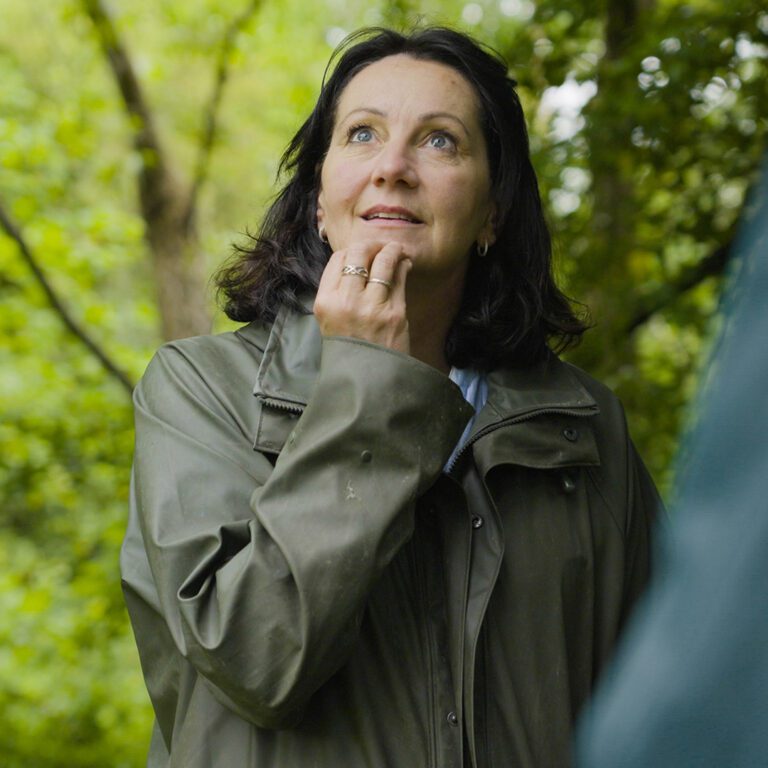One farm, one fight, one story
Nikki Dodd is the producer, director and cinematographer of One Last Farm. Her specialty is bringing stories about people and the planet to life through documentary film. In this blog, she shares her work documenting the challenges faced by Yew Tree Farm and bringing the story of nature-friendly farming to a wider audience.
Last spring, I spent hours and hours sitting in a hedge with my camera. Why, you might ask? I was on a mission to film the wildlife and rich biodiversity of Yew Tree Farm, Bristol’s last working farm.
As a filmmaker and cinematographer with a passion for wildlife, I’m always searching for stories that pose questions about our relationship with the planet. When I first read a news article about Yew Tree Farm, I was intrigued. Not only does Yew Tree Farm produce local, chemical-free food, but the farm’s grasslands and ancient hedgerows provide habitat for diverse wildlife. While industrial agriculture prioritises profit over a healthy environment, this small farm proves that food production and nature can thrive together.
But, as the news article revealed, pressures on the farm were mounting – both from a housing development and a cemetery expansion. I felt it was urgent to document farmer Catherine Wither’s fight to protect the farm’s unique habitats. So, over the course of a year, I followed Catherine’s journey, in what became the short documentary One Last Farm.
A sold-out premiere
In February, One Last Farm had its public premiere at the Bristol Aquarium’s Megascreen cinema. The event also featured Save Our Wild Isles: Hungry for Change, produced by Silverback Films in collaboration with WWF, the RSPB, and the National Trust. Two panel discussions followed, featuring farmers, environmentalists, and food system experts, sparking a spirited conversation about the vital connection between food production and a healthy planet.
The enthusiasm for the event was beyond anything I had initially imagined. A queue stretched around the block, and every seat in the 336-capacity cinema was filled.
Farming and nature: a complex reality
The first film of the evening, Save Our Wild Isles: Hungry for Change, shows how our industrialised food system is the leading driver of biodiversity loss in the UK, and crucially, what can be done to reduce its impact. While Hungry for Change explores the national picture, One Last Farm focuses on the local reality of the challenges faced by Bristol’s last working farm.
One theme that emerged from the discussions was that many farmers want to farm in harmony with nature, but lack the necessary support. Policy shifts, financial backing, and local consumers are all necessary to speed the transition to a nature-friendly food system. As Mei Casal from WWF-UK put it, “Farmers are the stewards of the land. They can be the leaders of change, but they cannot do it alone.”
Nick Gates, the director of Hungry for Change, highlighted the importance of education, saying: “We need to lobby government to put nature on the national curriculum.” And Patrick Holden, CEO of the Sustainable Food Trust, emphasised the role of local consumers, stating: “Nearly all the food in the supermarkets today is of a very low quality, vitality and safety. We need to use our buying power to buy food with a better story behind it.”
An uncertain future for Yew Tree Farm
The evening took an emotional turn when Catherine Withers, Yew Tree Farm’s dedicated farmer, shared some difficult news. In addition to pressure from developers and the South Bristol Cemetery expansion, Catherine is enmeshed in internal family disputes over the farm’s future. Despite her tireless efforts, she has been unable to secure her place at Yew Tree Farm.
“I’m broken hearted. I’m shattered into a thousand pieces and looking to try and farm somewhere else within Bristol or close by, because I’ve actually made this model work,” she shared.
The room erupted in applause for Catherine’s dedication. For me, having spent over a year documenting her journey, it was a bittersweet moment. I’ve witnessed first hand how much Catherine has given to protect this unique landscape – for wildlife, for the community, and for future generations.
Inspiring action
An audience survey showed that attendees were deeply moved by the event: 76% rated the event as “excellent,” and 70% said they felt inspired to take action. Many partners and sponsors contributed to the event’s success, including WWF, National Trust, RSPB Bristol Group, West of England Nature Partnership, Avon Wildlife Trust, Sustainable Food Trust, Better Food, Tobacco Factory, and CPRE Avon & Bristol. Their support underscored the power of collaboration in tackling these urgent challenges.
What’s next? A series of screenings
As this event demonstrated, film has the power to drive conversations and inspire change. Building on this momentum, we are launching a series of partner-driven screenings, both in-person and virtual. By screening the film with organisations, businesses, schools, and community groups, we aim to continue this vital conversation about farming, nature, and land use.
If Yew Tree Farm, a place cherished by Bristol’s community, faces such an uncertain future, what does that mean for other small, nature-friendly farms across the UK?
Learn more about One Last Farm and how you can host a screening at www.onelastfarm.com.
Share to
